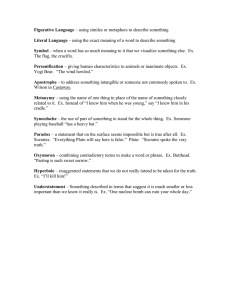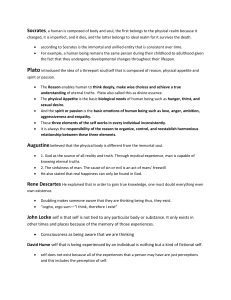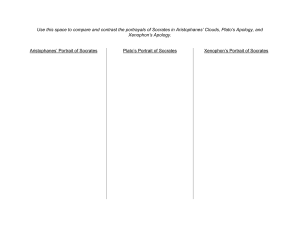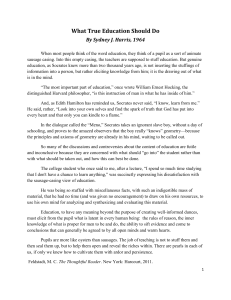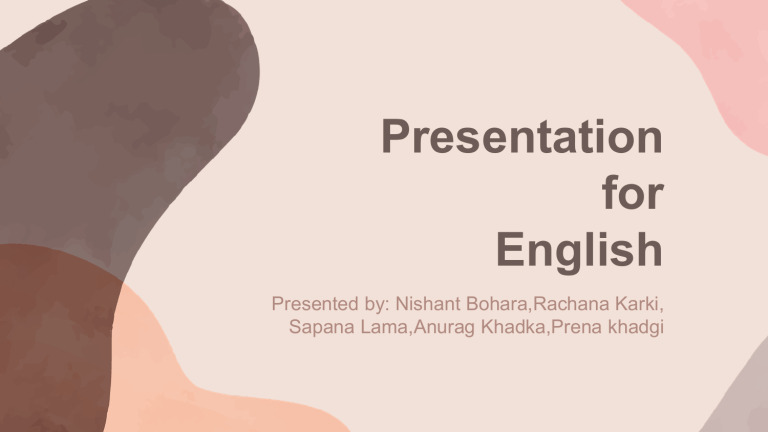
Presentation for English Presented by: Nishant Bohara,Rachana Karki, Sapana Lama,Anurag Khadka,Prena khadgi ACKNOWLEDGEMENT we’d want to convey our heartfelt appreciation and gratitude to our English teacher Mr.Dipak Manandhar sir For giving us the chance to work on this wonderful project CONTENTS 01 02 Introduction of writer 03 04 Interpretation Literal comprehension 05 Assimilation Critical thinking Introduction of writer Plato Plato (/ˈpleɪtoʊ/ PLAY-toe;[2] Greek: Πλάτων Plátōn; 428/427 or 424/423 – 348/347 BC) was a Greek philosopher born in Athens during the Classical period in Ancient Greece. He founded the Platonist school of thought and the Academy, the first institution of higher learning on the European continent. Plato was an innovator of the written dialogue and dialectic forms in philosophy. He raised problems for what later became all the major areas of both theoretical philosophy and practical philosophy. His most famous contribution is the theory of Forms known by pure reason, in which Plato presents a solution to the problem of universals, known as Platonism (also ambiguously called Born: Around 428 B.C either Platonic realism or Platonic idealism). He is also the namesake Death : Around 348 B.C of Platonic love and the Platonic solids. He Died in his sleep Literal Comprehension Phaedo and Echecrates were disciples of Socrates. Phaedo had seen his Guru, Socrates’ death. But Echecrates was not there in the time of Socrates’ death and he was very interested to know how his Guru was killed. So he asked his friend, Phaedo to give him minute details so Socrates’ death. Now Phaedo started giving him all details of Socrates death. He informed him that Socrates was accused of misleading youth by the Greek government. Then he was sentenced in Jain. Later on, the government announced him to be given the death penalty, so he was going be killed very soon. But he would not have killed until the ship from Delos came in Greek. Literal comprehension On the day of Socrates’ execution, his many friends, relative, and disciples had gone to Jail. All were sad and worried on that day but Socrates did not feel worried and tense. To please visitors, Socrates gave them philosophy on the soul. He told them that his body was perishable but his soul never be died after his death. After giving much philosophy on sour, he went to take a bath. Then again he returned to the same place. Now to execute him, the prison officer brought hemlock which had to be drunk by Socrates. Socrates laughingly drank it. At last, as a last wish, he requested his friend, Crito to offer a Cock to the healing god. Interpretation This story teaches us a lot about the concept of body and soul. For a human being, his body is nothing because it is perishable along with his death but his soul is immortal. So human being should believe in his soul because his real existence is there. All the above ideas we know from the Socrates teaching to his sad people who had gone to visit him in the Jail. Therefore, Socrates requested his friend Crito to offer a Cock to the healing god. So that, after his death, his soul would get peace and would not move here and there restlessly. He thought that the soul is immortal but the body is perishable. That’s why he will get a new life after his death. Critical Thinking There are many unacceptable ideas can be found. In this modern time, no one can believe in the existence of the soul. Likewise, we can also doubt in existence of God. So is there any healing god in the world? Can a soul exist? Is there life after death? Likewise, we can also raise a question upon Greek government: Wasn’t the Athenian government (Greek government) so cruel? Can’t a man have the right to express his free thinking? Assimilation The story teaches us a very important lesson that we should face the death bravely and we always should stand for the sake of truth and Justice. While reading the story, We remembered our four martyrs: Sukra Raj Dharma Bhakta, Gangalal, and Dasharath Chand. They choose brave death rather than cowardice life. They all died for the sake of democracy and humanity. Like Socrates, they did not care for their personal needs and just thought for others. Thank you
